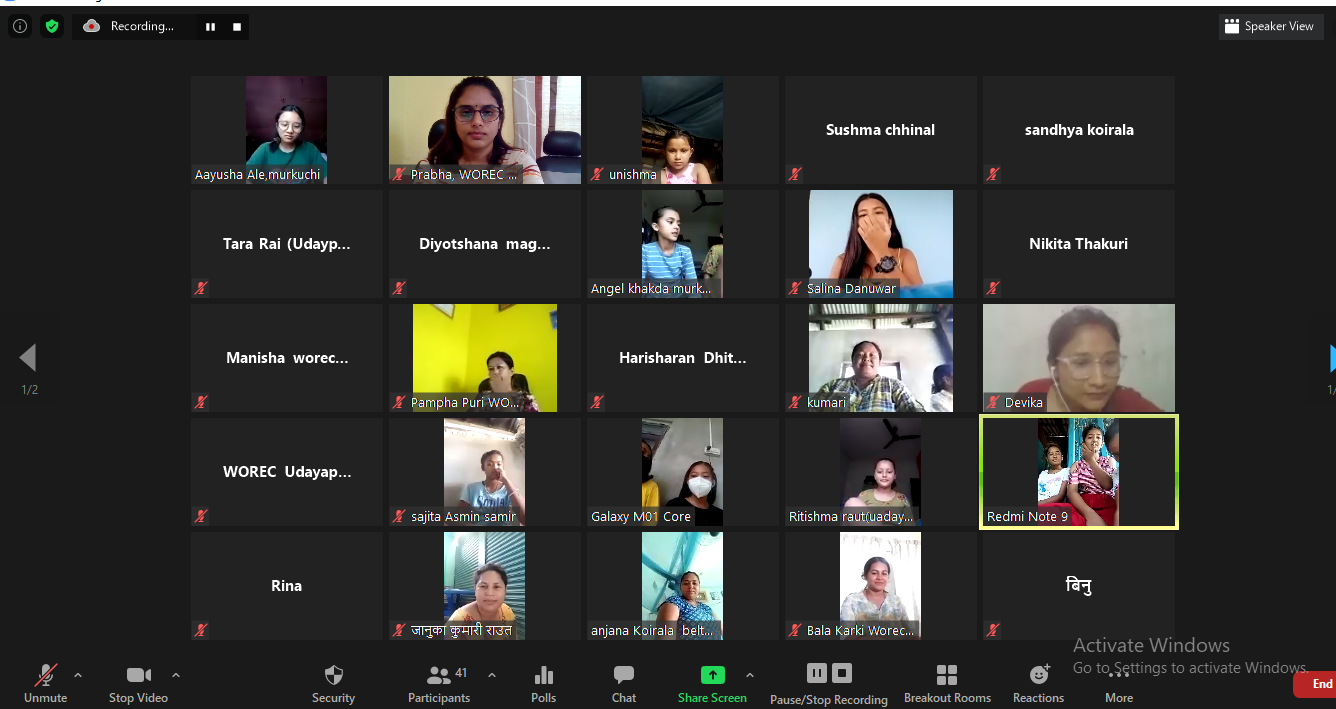
A few years ago, when Rupali (name changed), 18 years old student from Udayapur, found out that her Facebook had been allegedly hacked, she said that the whole experience was the worst nightmare. “My Facebook account was hacked, and the hacker had changed my profile name into an obscene word. I was horrified,” said Rupali.
Although Rupali was able to get access to her Facebook account from her mobile number with the help of her brother, she said she hasn’t fully recovered from the mental agony the experience caused her. “Though I don’t know who hacked my Facebook account, I am certain that one of my friends did it since I had shared my Facebook password with my friends. I will never repeat such a mistake,” Rupali shared her experience in the orientation workshop on cyber-security awareness, which was organized on June 25, 2021.
The one-day orientation workshop on cyber-security awareness targeted at adolescents and youths was organized by WOREC Udayapur in coordination with the district Police office Udayapur. The main objectives of the orientation were to raise awareness on cybersecurity and promote a better understanding of cybercrime and the preventive measures against cybercrime.
Addressing the issue, Police Inspector Lal Bahadur Shrestha said that what Rupali experienced is one of the types of cybercrime, and he urged everyone to be more careful while using the internet and mobile phone as they can be easily duped by both strangers and the people they know.
.png) Caption: Police Inspector Lal Bahadur Shrestha giving an orientation on Cybercrime and cybersecurity.
Caption: Police Inspector Lal Bahadur Shrestha giving an orientation on Cybercrime and cybersecurity.
“In the present time where virtual reality and offline world are no longer viewed as separate experiential realms, online abuse and harassments should be taken seriously. And although online platforms can be empowering, the dark side of cyberspace should not go unnoticed. Therefore, proper understanding and awareness should be there for digital safety and digital security,” said Shrestha.
In the program, Shrestha imparted his knowledge on cybercrime and cybersecurity to the participants through an interactive session, which was encompassed with a presentation that included laws and statistics related to cybercrimes, social media platforms and online safety and privacy.
In Nepal, some commonly committed cybercrimes are related to misinformation, identity theft, child pornography, harassment through social media, online stalking, cyber-bullying and defamation. According to the news report, on average, Cyber Bureau receive up to 32 written complaints related to cybercrime per day.
Although many cases related to cybercrimes are reported, Nepal doesn’t yet have adequate laws to deal with cybercrimes. Therefore, all kinds of crimes taking place in the online space are handled under the Electronic Transaction Act-2008, which has a provision of a jail term of up to five years or a fine up to Rs 20,000.
However, Shrestha informed that it can be challenging to track down the online perpetrators as they don’t leave evidence that could be used against them. “The online platform is a tricky place. The perpetrator can commit the crime by creating a fake ID in the name of another person. While screenshots of the messages may work as evidence in the initial stage of the investigation, it is not regarded as authentic evidence, so it is difficult and time-consuming for law enforcement to bring the perpetrators to justice.” said Shrestha.
Following this information, Sita Ghimire (name changed) shared her own experience with cyberstalking and harassment and said that she has frequently been getting unsolicited messages and comments on her Facebook page and her Facebook messenger from random profiles. She further requested Shrestha to provide some preventive measures to stop these activities. “I have been getting offensive messages and comments on my social media from unknown Facebook profiles. I feel uncomfortable, and I want to stop this from happening,” said Ghimire.
Shrestha suggested that the way to deal with bullying and harassment online is by using preventive tools to unfriend, block or report the person who is abusive. “I recommend people to make the most out of the privacy setting on their social media. Likewise, to prevent hackers from hacking, one should ensure a two-factor authentication for their social media accounts,” said Shrestha.
Shrestha also said that some of the common mistakes that make people vulnerable to cybercrime include sharing social media passwords with others and poor credentials, such as easy and repeated passwords on many platforms.
In the program, Prabha Poudel, program officer at WOREC Udayapur, also stated that while violence and abuse against women and girls have become a far too common experience in real lives, the evolution of online platforms has further extended offline gender-based violence and gender-based inequalities to the online arena.
“Open display of abuse directed at visible and audible women within the cyberspace indicates the existence of an extended version of gender inequalities and gender-based violence in a virtual world. But what’s more disturbing is the fact that the majority of people don’t take online abuse as seriously as physical abuse,” said Poudel. “Thus, there should be clear-cut message throughout the population that whether it is done in-person or in social media, Harassment is Harassment, and it’s unacceptable.”
Various studies show that online bullying, trolling, cyberstalking, public shaming, identity theft, hacking, defamation, and hate speech, including rape and death threats, are different forms of cybercrimes directed at women for merely expressing their opinions online. As a result, women and girls start self-censoring themselves or even worse, some even leave the online platform after being harassed.
The program featured representatives from Rautahit Centre, Nava Jyoti Women Empowerment Community Center, Chetanshil Women Community Center, and WOREC’s staff. A total of 49 adolescent girls and boys from different municipalities of Udayapur participated in the program.